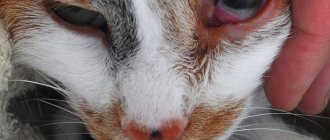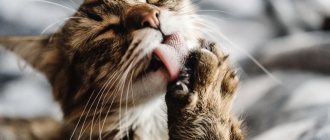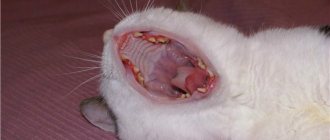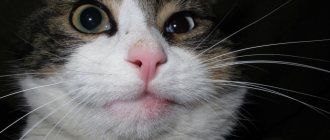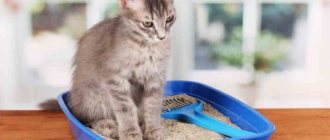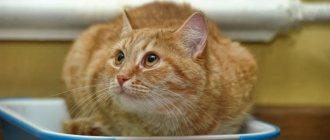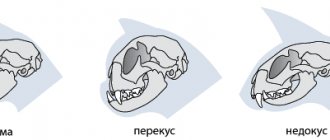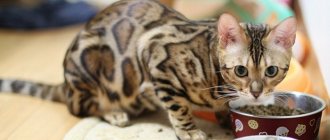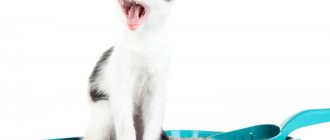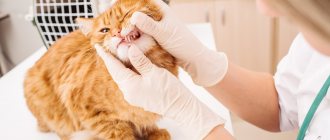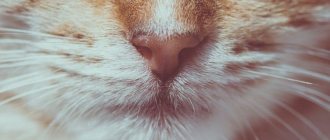The reasons why a kitten is constantly or periodically constipated can be varied. The most common include poor nutrition, progression of helminthiasis, and stress. If the problem is constantly bothering you and cannot be eliminated using usual means, it is better to visit a veterinarian who, based on the diagnostic results, can help cope with the disease. If constipation is left untreated and the disease progresses, the consequences can be unpredictable, including the death of the kitten.
Main reasons
In a newborn kitten of three weeks of age, constant problems with defecation often indicate congenital anomalies in the structure of the digestive organs. In a two-month-old baby, hard stool may indicate poor-quality nutrition or incorrectly selected foods for the first feeding. Other reasons why young kittens experience periodic or chronic constipation include:
- overeating or undereating;
- lack of fluid in the body;
- poor quality food;
- entry of a foreign object into the digestive organs;
- helminthic infestation;
- inactive lifestyle;
- kidney and liver diseases;
- neoplasms of a benign or malignant nature.
What symptoms appear?
An animal with this problem may also suffer from bloating.
Constipation in a one-month-old kitten or an older baby is always accompanied by restless behavior of the animal.
The kitten meows loudly and refuses to eat. On palpation, the abdomen is hard, swollen, filled with gases. The cat may often squat down to poop, but nothing comes out, or during defecation, a foul-smelling green slurry is released instead of feces. If you still managed to squeeze out feces, then in appearance it resembles dry peas. With such symptoms, cats require urgent medical attention; untimely treatment leads to general intoxication of the body and even the death of the baby.
Types of diarrhea in kittens
By the frequency of bowel movements, the nature, color, and consistency of stool, you can determine the possible cause of diarrhea. In this case, the main cause of intestinal disorder in small pets can be determined by a veterinarian after conducting a number of laboratory diagnostic tests.
Diarrhea with foam and mucus
Loose stool in a 2-month-old kitten with a large amount of foam, mucus, particles of undigested food, and blood is most often detected when the cat is infected with helminths. In addition to diarrhea, the kitten may suffer from vomiting and nausea. Such symptoms usually occur immediately after eating if the pet’s appetite is preserved. Possible increase in general temperature, severe weakness, allergic manifestations, muscle spasms.
Important! Parasites, the simplest organisms (giardia, isospores, trichomonas) violate the integrity of tissues and internal organs in places where they are localized, provoke acute inflammation, and release harmful endotoxins.
A pet infested with parasitic worms refuses food and favorite treats, quickly loses weight, looks apathetic, depressed, and exhausted. Kittens infected with worms lag behind in growth and development compared to their healthy relatives. Severe helminthic infestation can cause death due to severe intoxication, exhaustion, blockage or rupture of the intestine.
First aid
Usually, at 2 months, kittens try their first complementary foods. It is the appearance of new foods in the diet that contributes to disruption of the functioning of the digestive organs. This disorder is not dangerous if you help your child cope with it in time. A universal remedy to alleviate the condition of a small cat is Vaseline oil, which is useful to drip into the mouth at the rate of 1.5 ml/kg of body weight. Any vegetable oil is immediately absorbed by the intestines, but this does not happen with Vaseline. The product lubricates the inner wall of the rectum, causing constipation to quickly go away.
To prepare a laxative, you can use condensed milk.
Sunflower oil added to dietary food also contributes to its quality digestion. In addition, you can make a portable drink from cold water and condensed milk. However, you should be careful with the amount of the drug, since in large quantities it negatively affects the condition of the liver. If these methods do not help, the baby’s belly is very swollen and the cat is in pain, you can use a microenema based on chamomile infusion or insert a small piece of laundry soap into the anus. If the condition does not improve and other pathological signs appear, it is better not to delay visiting a doctor.
What treatment is prescribed?
Effective drugs
The following remedies will help cure constipation in small cats:
- "Duphalac". The main component of the drug is lactulose, which is very effective for problems with stool. The individual dosage should be obtained from your veterinarian.
- "Espumizan". Completely harmless to animals. Helps eliminate gases and flatulence.
- "Festal". Normalizes the production of enzymes, thereby improving digestion.
- "Bifidumbacterin". An additive that will help to multiply beneficial microflora in the intestines.
Microclysters
You can rinse the animal's intestines using the smallest syringe.
To prevent the kitten from suffering from abdominal pain, it is recommended to give it an enema. To do this, use the smallest enema. The composition of the solution can be varied, but the following are often prepared:
- chamomile infusion;
- soapy water;
- mineral oil solution;
- regular cool water.
The sequence of the procedure is as follows:
- Place the kitten in a basin, bathtub or other container, the main thing is that it can then be easily cleaned of feces.
- Securely secure the animal in a standing position.
- Lubricate the tip of the syringe with Vaseline, then carefully insert it into the anus.
- It is important to squeeze out the water carefully so as not to cause pain to the baby. The effect comes instantly.
Veterinarians advise doing an enema in the morning, immediately after sleep and before feeding, while the small pet is still relaxed.
Abdominal massage
It is advisable to conduct such sessions daily so that the baby does not have tummy problems.
You can massage your pet at home. If the cat was brought into the house before the age of 3 months, it is useful to carry out massage procedures regularly, which helps stimulate the functioning of the internal organs. For constipation, stroking movements not only improve peristalsis, they also act as a pain reliever. It will be possible to improve digestion if you do light strokes 3-4 times every day for 7-10 minutes.
Folk remedies
If a one-week-old kitten is constipated, you can give him condensed milk diluted in cool water as a laxative. No less effective is Vaseline oil, which is not digested in the stomach and is not absorbed in the intestines, due to which dense stool is well lubricated in the rectum and easily comes out. However, it is worth remembering that if the pet does not feel better within 1-2 days and home remedies are ineffective, it is necessary to urgently take the cat to the hospital so that it does not die from intoxication and other complications.
What to feed?
To avoid such a problem, a suitable milk formula is selected for the baby.
The diet of a kitten suffering from frequent constipation is compiled by a veterinarian, taking into account the cause of digestive problems, age, and other individual characteristics of the body.
If the baby is not yet 2 months old, the basis of the diet should consist of a special milk formula, liquid oatmeal or semolina. Older pets are allowed to diversify their menu with cottage cheese, kefir, and chopped boiled chicken. An adult 6-month-old kitten is transferred to a more expanded diet, including various cereals, fish, vegetables, fruits, and eggs. If a cat eats ready-made factory food, it is better to buy it a premium and super-premium product. Cheap food does not provide the body with the necessary substances and, at the same time, disrupts the functioning of the digestive system.
Diarrhea in small kittens
Diarrhea (diarrhea) is a condition characterized by frequent bowel movements with the release of liquid excrement. It occurs due to increased intestinal peristalsis, accelerating the movement of feces, provoked by various unfavorable factors.
Important! Stomach upset in kittens is a fairly common problem that furry pet breeders may encounter. The gastrointestinal tract of a kitten up to 3-4 months of age is not completely populated with beneficial intestinal microflora that takes part in the digestive processes. At an early age, the intestinal mucosa is very susceptible to irritating factors.
In kittens at the age of two months, liquid, soft, mushy stool of brown, brownish-yellow color is considered normal . But if a pet defecates more than 5-6 times a day, experiences pain during defecation, and at the same time mucus, foam, bloody substances, and undigested food are noticeable in the stool - this is a very alarming symptom that needs to be stopped as quickly as possible. Prolonged profuse diarrhea leads to dehydration and weakening of the body, which is very dangerous for 2-month-old kittens.
What to do for prevention?
The owner who takes a four-legged baby into his home must understand that the health and proper development of the pet’s body depends on proper care and maintenance. If the kitten has ever had digestive problems and was bothered by constipation, after eliminating the disease, it is necessary to continue to constantly monitor so that this does not happen again.
As a preventive measure, veterinarians advise reviewing the animal’s diet and excluding from it foods that are prohibited for the cat’s body. It is best to switch your pet to ready-made food, which will help solve the problem of constipation. In addition, do not forget about drinking regime, physical activity, timely treatment of various diseases and scheduled preventive visits to the veterinarian.
Why is diarrhea dangerous for kittens?
Animal owners must understand that diarrhea is not a separate disease, but a symptom of systemic diseases, functional malfunctions in the body, diseases of various etiologies and genesis. Therefore, if a kitten is diarrhea, the baby's loose stools are most often accompanied by various symptoms, which depend on the underlying cause.
Symptoms of diarrhea:
- decreased activity, lethargy, drowsiness;
- dull, matte coat;
- allergic manifestations;
- chills, fever, high temperature;
- anemia, cyanosis of mucous membranes;
- loss of appetite, complete refusal of food;
- skin itching;
- unstable stool;
- increased thirst;
- muscle cramps, spasms;
- discharge from the nose, eyes.
Important! Diarrhea in kittens can be acute or chronic, which lasts more than three to five days or appears periodically due to constant exposure to provoking factors.
The severity and intensity of the manifestation of clinical signs depends on age, resistance, individual characteristics, severity of the lesion, stage of the disease, and the root cause.
It is important to understand that diarrhea removes useful substances from the body, disrupts metabolism, water and electrolyte balance, and the functioning of internal systems and organs.
Profuse diarrhea, which lasts more than two days, not only weakens the body of a small cat, but can also provoke intoxication and dehydration.
Prolonged dehydration is very dangerous for the life of two-month-old kittens, so if a kitten is diarrhea, you need to stop the diarrhea as quickly as possible to avoid the development of serious complications.
